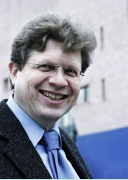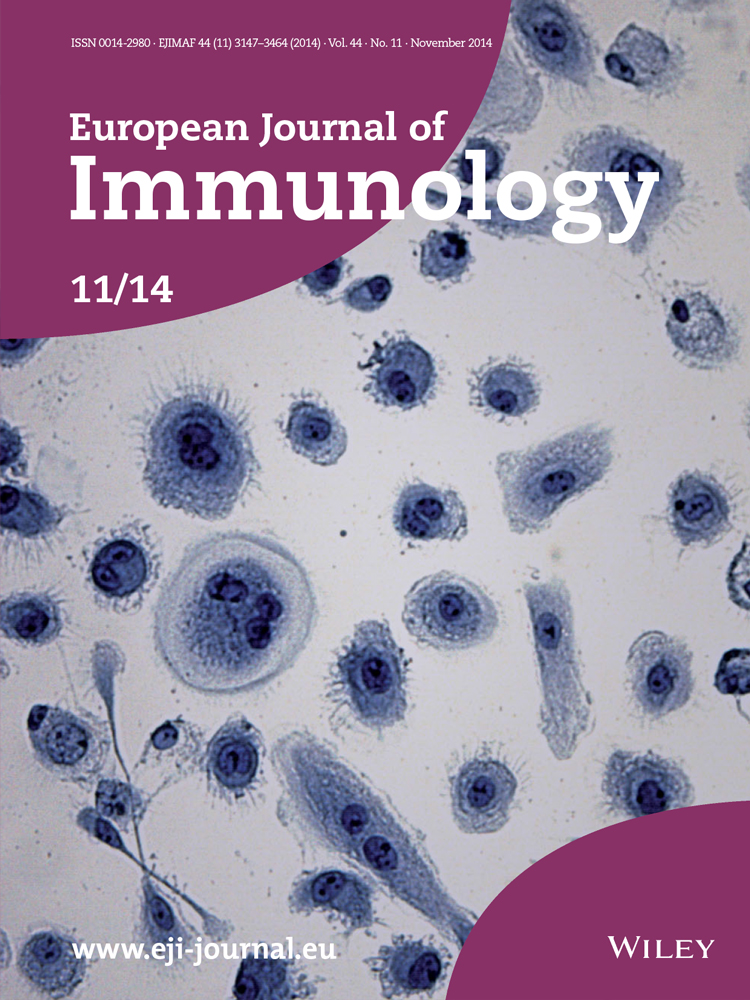Andreas Radbruch: Winner of the Avery-Landsteiner Prize for Immunology 2014
During the annual meeting of the German Society for Immunology (DGfI) in Bonn in September 2014, the Avery-Landsteiner Prize was awarded to Andreas Radbruch for his outstanding contributions in the field of adaptive immunity, which lead to a completely new understanding of the concept of immunological memory 1. Andreas Radbruch is the Director of the German Rheumatism Research Centre (DRFZ) in Berlin, Professor of Experimental Rheumatology at the Charité−Universitätsmedizin in Berlin, and Chairman of the Executive Committee of the European Journal of Immunology.
During his laudation, Hans-Martin Jäck, president of the DGfI, mentioned that „Our Society (DGfI) has in the past honoured many leading international immunologists, and I am delighted that this year Prof. Dr. Andreas Radbruch, one of the leading German immunologists, was chosen. It is with great pride that we donate the 2014 Prize to Dr. Radbruch for his outstanding contributions to our understating of how antibody-secreting plasma cells adapt to different infections by induction of immunoglobulin class switch recombination, his leading figure in the development of the magnetic cell sorting technology, and his discovery that long-lived memory plasma cells persist in dedicated niches in the bone marrow for many years.”
Immunological memory protects healthy people from re-infection and is crucial for successful vaccination. In patients with chronic inflammatory diseases, however, destructive, pathogenic memory cells can develop and persist. This completely new concept of immunological memory, together with the elucidation of underlying mechanisms that keep pathogenic memory cells alive, open up novel therapeutic possibilities.
Thanks to the continuous and generous support by CLS Behring, the Avery-Landsteiner Prize can be awarded every two years to an internationally outstanding and highly distinguished immunologist and carries a monetary prize of € 10 000 2. As noted by Hans-Martin Jäck, “The Avery-Landsteiner Prize is the most prestigious scientific award conferred by the German Society for Immunology.”
The Avery-Landsteiner Prize is named after two scientists who made important contributions to today's understanding of immunology: Oswald Avery, M.D., one of the world's first molecular biologists and a pioneer in immunochemistry, who discovered that the genetic material consist of DNA and that antibodies can be raised against (together with Michael Heidelberger); and Karl Landsteiner, M.D., known as the ‘father of transfusion medicine’, who received both The Nobel Prize in Physiology or Medicine in 1930 and the Lasker Award in 1946. Landsteiner characterized the ABO-blood group antigen system, identified the polio virus as a causative agent of poliomyelitis (with Karl Popper), and discovered the Rhesus factor (with Alexander Wiener).
References
Q & A with Andreas Radbruch
What does this award mean to you?
It's a great honor to be in line with all the scientists who have received this prize before, all of them being among the most distinguished immunologists. And it's also a great satisfaction when your work is acknowledged in such a way by your peers and the experts in the field, and in particular, when it implies that some good old paradigms are being questioned.
Why did you choose to research immunology?
I started to become interested in immunology as a student at Bonn University in 1974. I was fascinated by the challenges immunology provided at that time, and in particular, to understand the genetic basis of the antigen receptor variability. And, as a biologist, I saw this as an opportunity to do something with biomedical relevance.

Andreas Radbruch
Who has been inspirational/influential with regard to your scientific career?
I was introduced to immunology by a botanist, Dieter Klämbt (Bonn University), and into genetics by Alfred Gropp, a pediatric pathologist. My mentor thereafter, at the University of Cologne, was Klaus Rajewsky. I worked with Klaus at the Institute for Genetics in Cologne for 20 years, from 1976 to 1996. My interest in epigenetics comes from my encounters with Peter Starlinger and Walter Doerfler at that institute. In 1986/87 I joined Max Cooper's lab at the University of Alabama for a sabbatical. Max's personality has impressed and influenced me enormously. Av Mitchison recruited me to Berlin, and I had the privilege to share some time with him at the Deutsches Rheuma-ForschungsZentrum (DRFZ), an education in scientific skepticism. Today, I enjoy my coffee breaks with Fritz Melchers; conversations with him are always an inspiration.
What is the current focus of your work?
Today, my interest is still focused on understanding immunological memory, both its systemic organization and its molecular basis. We have just begun to unveil its secrets. The generation, lifestyle and reactivation of the memory cells, the adaptation and aging of immunological memory, or how immunological memory drives chronic inflammatory diseases are some aspects that are still unknown. The change of paradigm that we have presented (from “memory cells with a half-life” and “homeostatic proliferation” to “conditional survival of memory cells”) implies that we have to understand the signals for “conditional survival”, which are provided by cells in the environment, in particular stromal cells. To do so, we have to understand the development and lifestyle of stromal cells, which is a real challenge.
What, do you feel, is currently the most exciting topic in immunology? Excluding your own work of course!
From a personal point of view, I think it is a molecular understanding of the dialogue between cells of the immune system with their environment, “the immune system in context”. And also a molecular understanding of how cells of the immune system are imprinted in differentiation, on multiple levels, genetic, epigenetic, transcriptional and signaling competence. This includes understanding a broader spectrum of cell types than ever before, such as the zoo of “innate” lymphocytes.
Do you have any advice for students starting on their immunological career?
Don't get lost in the details, keep the overview. Be aware of the numbers. Work on real challenges. If something apparently cannot be done, try to find a way to do it, and do it.
What do you think will be the big breakthroughs in immunology in the next decade?
It is easy to predict that the change from “hypothesis-driven” research to “hypothesis-generating” global analyses is already, and will continue to systematically identify the molecular players of the immune system. Otherwise, and regarding the unexpected discoveries and revisions of existing paradigms, I also feel that the development of novel technologies will allow us to look at things that are so far undetectable. “Predictions are hard to make, especially about the future” (Karl Valentin).
If you weren't an immunologist what would you have become?
An archeologist. Like immunology, archeology is a challenge; you have to be creative and have structured thinking to decipher the lifestyle of our ancestors from the few artefacts available.




